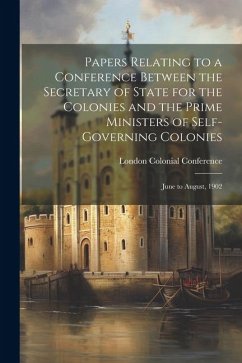
British Prime Ministers Of The Nineteenth Century
Versandkostenfrei!
Versandfertig in 1-2 Wochen
25,99 €
inkl. MwSt.

PAYBACK Punkte
13 °P sammeln!
BRITISH PRIME MINISTERS OF THE NINETEENTH CENTURY By F. J. C. HEARNSHAW CONTENTS: I. HENRY ADDINGTON II. WILLIAM PITT III. WILLIAM, LORD GRENVILLE IV. THE DUKE OF PORTLAND V,- SPENCER PERCEVAL VI. THE EARL OF LIVERPOOL VII. GEORGE CANNING VIII. VISCOUNT GODERICH IX. THE DUKE OF WELLINGTON X. EARL GREY .... XI. VISCOUNT MELBOURNE I XII, SIR ROBERT PEEL I XIII. VISCOUNT MELBOURNE II XIV. SIR ROBERT PEEL-II XV. LORD JOHN RUSSELL I XVI. THE EARL OF DERBY-I XVIL THE EARL OF ABERDEEN XVIII. VISCOUNT PALMERSTON I XIX. THE EARL OF DERBY II XX. VISCOUNT PALMERSTON II XXI. EARL RUSSELL II XXII. THE EARL...
BRITISH PRIME MINISTERS OF THE NINETEENTH CENTURY By F. J. C. HEARNSHAW CONTENTS: I. HENRY ADDINGTON II. WILLIAM PITT III. WILLIAM, LORD GRENVILLE IV. THE DUKE OF PORTLAND V,- SPENCER PERCEVAL VI. THE EARL OF LIVERPOOL VII. GEORGE CANNING VIII. VISCOUNT GODERICH IX. THE DUKE OF WELLINGTON X. EARL GREY .... XI. VISCOUNT MELBOURNE I XII, SIR ROBERT PEEL I XIII. VISCOUNT MELBOURNE II XIV. SIR ROBERT PEEL-II XV. LORD JOHN RUSSELL I XVI. THE EARL OF DERBY-I XVIL THE EARL OF ABERDEEN XVIII. VISCOUNT PALMERSTON I XIX. THE EARL OF DERBY II XX. VISCOUNT PALMERSTON II XXI. EARL RUSSELL II XXII. THE EARL OF DERBY III XXIII. BENJAMIN DISRAELI I XXIV. WILLIAM EWART GLADSTONE I XXV. BENJAMIN DISRAELI, EARL OF BEACONSFIELD II XXVI. WILLIAM EWART GLADSTONE II XXVII. THE MARQUIS OF SALISBURY I XXVUI. WILLIAM EWART GLADSTONE III XXIX. THE MARQUIS OF SALISBURY II XXX. WILLIAM EWART GLADSTONE IV XXXI. THE EARL OF ROSEBERY XXXII. THE MARQUIS OF SALISBURY III FEW centuries of the Christian era have opened more inauspiciously for Great Britain than the nineteenth. The Government of George III. was at war with the rejuvenated France over which Napoleon Bonaparte had secured control The great coalition against the French which Pitt had laboriously constructed in 1799 had completely collapsed Russia had broken away amid furious recriminations in 1800 Austria, after the crushing defeats of Marengo and Hohenlinden, was negotiating a separate peace at Luneville, Britain was left to face the might of the First Consul alone. To make her situation worse, the Baltic Powers, resentful of the manner in which she exercised her command of the sea, had organised an Armed Neutrality (December, 1800), whose purpose was to resist the British claim to search neutral vessels on the high seas and confiscate contraband of war found upon them. At home much distress prevailed owing to the rapid increase in population, the disorganisation of industry and commerce due to the war, and the failure of the harvest of 1800 a failure that caused the price of wheat to rise to loss, a quarter. Finally, Ireland was seething with rebellion. The rising of 1798, together with its severe repression, was still fresh in men's memories. Passions continued, moreover, to run high respecting the Act of Union which Pitt, as a war measure, had forced through the Parliaments of the two countries : it came into force on the first day of the century. But what caused the greatest perturbation was the fact that Pitt was being prevented by the King from fulfilling one of the promises by means of which he had persuaded the Irish Parliament to consent to its own extinction. He had promised Ireland a generous measure of Catholic Emancipation. George III. had allowed him to make the promise but when Pitt approached him respecting the terms of its fulfilment, he was informed that the King's coronation oath to defend the Protestant establishment would not permit him to open die doors of Parliament and office to Papists. Pitt, feeling that his honour was involved, placed his resignation in the King's hands (March 14, 1801). Other causes, also, conduced to tie same end. He had been Prime Minister since December, 1783 he was weary, out of health, prematurely old, though but little over forty years of age. Above all, he realised that the country needed peace, if it could be procured and he felt that he, after all he had said and done against the French in general and Bonaparte in particular, was not the man to seek or obtain it. ADDINGTON (MARCH, 1801 - MAY, 1804) Keywords: Viscount Palmerston William Ewart Gladstone Benjamin Disraeli Sir Robert Peel British Prime Ministers Marquis Salisbury Duke Melbourne Earl Of Rosebery F J C Hearnshaw Lord Grenville Spencer Perceval Henry Addington Nineteenth Century














